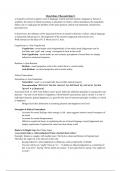Meta Ethics (“Beyond Ethics”)
a) Cognitive and non-cognitive uses of language, realism and anti-realism, language as factual or
symbolic, the nature of ethical assertions as absolutist or relative, ethical naturalism, the naturalistic
fallacy, the is–ought gap, the problem of the open question, ethical non-naturalism, intuitionism,
prescriptivism.
b) Emotivism, the influence of the logical positivism on emotivist theories of ethics, ethical language
as functional and persuasive. Developments of the emotivist approach and criticism of it.
With reference to the ideas of G E Moore and A J Ayer.
Cognitivism vs. Non-Cognitivism
Cognitivism - moral truths exist independently of our mind; moral judgements can be
true/false and ‘right’ and ‘wrong’ correspond to facts in the world
Non-Cognitivism - moral truths are non-existent, perceptions of moral facts are simply
subjective emotional responses
Realism vs Anti-Realism
Realism - moral properties exist in the world; there is a moral reality
Anti-Realism - no moral properties and no moral reality
Ethical Naturalism:
Naturalism vs Non-Naturalism
Naturalism: ‘good’ is an empirically discoverable natural property
Non-naturalism: Ethical terms cannot be defined by natural terms
(good ≠ pleasure)
Associated with J.S. Mill, who defines moral ‘good’ under the utilitarian principle of causing the most
pleasure - ‘the end of our desires is happiness, which benefits each person, and as society is a sum of
individual interests, general happiness is a good for this sum of interests (principle of utility), so Good
is happiness
- Bridges fact/value distinction in assuming pleasure and happiness are Good
Strengths of Ethical Naturalism:
- Accounts for moral feelings when outrage is felt - pain suggests intrinsic moral wrongness of
an action
- Accounts for moral disagreements
- Effective cognitivist theory in explaining the use of moral language: moral judgements not
simply expressions of opinion but claim true facts about world
Hume’s Is/Ought Gap (Fact/Value Gap):
‘you cannot make a value judgement from a factual observation.’
Example: Dennis is a puppy with muddy paws. The Sofa is clean and Dennis will spread mud.
Therefore he ought not to be allowed on the sofa.
- passing inductive value judgements is fallacious, unless empirically verifiable
- You can’t derive an “ought” from an “is” – “to define an ethical judgement as a statement of
fact is an error”. Saying “he has stolen my money” is not equivalent to saying “you ought not
to steal”.
, Weaknesses of Ethical Naturalism:
G.E. Moore - Non-naturalist Cognitivist (unlike Ayer and Stevenson)
believes that goodness can be known (cognitively), but not by a posteriori sense experience
We cannot find natural truths in properties; they are a priori/non-definable properties
Principia Ethica: “My objections to Naturalism are that it offers no reason at all, for any ethical
principle whatever; and in this it already fails to satisfy the requirements of Ethics, as a scientific
study. But in the second place I contend that, though it gives a reason for no ethical principle, it is the
cause of the acceptance of false principles-it deludes the mind into accepting ethical principles, which
are false; and in this it is contrary to every aim of Ethics.”
Moore’s Open Question Argument
States the claim ‘Is Good pleasure?’ would be superfluous if reason would naturally lead to assent to
this question (making it a closed question) - as this is a debated topic, Mill’s definition must be
misleading
Premise 1: Good = N (Pleasure)
Premise 2: If X = N then X = Good
Premise 3: “Is X good?” = Meaningless question
- If pleasure is always good (if II premises are accepted) inquiring about goodness is
meaningless
Premise 4: “Is X good?” ≠ Meaningless as absolute overlap between
good/pleasure isn’t clear, is instead an “Open Question” (no conceptual
confusion, genuine question)
Premise 5: X ≠ Good (not exactly equivalent, as the question would else
be superfluous)
Premise 6: Good ≠ N
Conclusion: Naturalist Moral Realism is false
Leads Moore to recognising the naturalistic fallacy: when attempts are made to define non-natural
objects, such as the word ‘good’, in terms of some natural quality (‘pleasure’)
Ayer argues if we can still ask the question “is it good?” after asking “is it pleasurable?”, must mean
goodness or badness is something other than the pleasure or pain produced
Criticisms:
- ‘Begging the question’ assumes conclusion of argument during premises (Premise 4)
- Should have set up open question more explicitly and intentionally
- Conclusion is in included in Premise 4 - structure is insufficient
- ‘Good’ can’t be defined as a simple concept as it is not reducible to an empirical value
- If ‘good’ is a distinct value known through intuition, why do moral discussions exist?
- Nietzsche: views on morals differ (‘ethical colorblindness’) ??? perspective bias
- Intuition - legitimacy questionable
Intuitionism:
Good is a simple concept knowable through intuition - cannot be explained, but recognised




